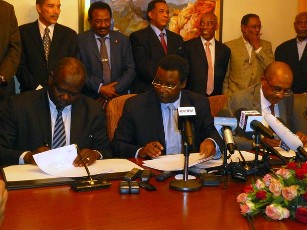Khartoum and Juba exchange proposals on border security: sources
May 30, 2012 (KHARTOUM) – Negotiators from Sudan and South Sudan on Wednesday shared views of what they expect from each other in order to settle security and border issues, Sudan Tribune has been told.

Negotiations between Khartoum and Juba resumed on Tuesday after a two-month hiatus that saw the two neighbors fighting a war around disputed oil region of Heglig which was briefly occupied by South Sudan before being re-taken by Sudan.
The sources revealed that the two sides presented proposals on security issues, including cessation of support to rebels, disputed regions and cross-border hostilities.
According to the sources, the proposal of Khartoum’s negotiators contained demands that Juba severs its ties with “the 9th and 10th divisions” of the southern army, SPLA, in reference to the combatants of the rebel Sudan People’s Liberation Movement North (SPLM-N) which is fighting the Sudanese government in the country’s border regions of South Kordofan and Blue Nile.
Khartoum’s negotiators said that the two SPLA divisions-turned-rebels in the run-up to South Sudan’s secession last year must accept to be disarmed in order to find a comprehensive solution to their situation, either through the Disarmament, Demobilization and Reintegration program (DDR) which is a key provision of the Comprehensive Peace Agreement (CPA).
Sudanese negotiators also indicated the possibility of holding direct negotiations with the commanders of SPLM-N forces under the supervision of the AUHIP led by former South African President Thabo Mbeki.
The security problems have gradually been part of the talks on the outstanding issues in the implementation of the CPA the two parties signed in 2005.
The fighting in South Kordofan between the Sudanese army and the SPLM-North stems from the failure of the two sides to agree on the implementation of security arrangements. The lack of a clear mechanism in the CPA on how and when they should be disarmed led to military confrontation between them when the Sudan Armed Forces (SAF) threatened to forcefully disarm the SPLM-N combatants.
On the other hand Juba, since before the start of South Kordofan rebellion, accuses Khartoum of backing rebel groups that appeared in South Sudan after April 2010 elections.
Furthermore, the negotiators demanded that South Sudan ceases all forms of support to rebel groups from the western region of Darfur and expels them from its territories. Khartoum’s team also demanded that SPLA forces withdraw south of the 1956 borders and asked for the formation of a committee to monitor this process.
On the other hand, Juba’s proposal insisted that Khartoum reinstates commitment to all previous agreements, including the one signed in June 2011 between Sudan’s presidential assistant, Nafie Ali Nafie, and the SPLM-N rebels in Addis Ababa.
The said agreement provided a framework for settling the conflict in South Kordofan as well as recognising the SPLM-N as a legal political force in Sudan. It was however scrapped by President Al-Bashir following a fierce campaign by anti-SPLM forces in Khartoum.
South Sudanese negotiators also insisted that Sudan pledges “in writing” to cease support to southern rebel groups as well as aerial bombardment in southern territories.
South Sudan repeatedly accuses Khartoum of conducting air raids on its territories as well as supporting rebel groups operating mainly in the South Sudan’s northern states of Unity and Upper Nile.
The southern delegation further demanded that all disputed border regions be turned into demilitarised zones under a joint administration. The sources added that the southern delegation also demanded the immediate start of negotiations on oil exports.
Sudan Tribune’s sources said that the coming hours would be crucial in determining the course of the negotiations. They said they expect that if the mini-committee manages to make progress, it would pave the way for holding a meeting of the joint political-security committee headed by the ministers of defense and chiefs of security from both sides within 48 hours.
The sources also added that the two sides are competing to demonstrate commitment to the AU roadmap and the UN Security Council (UNSC)’s resolution number 2046, which ordered them to conclude negotiations on citizenship, oil, borders and the status of Abyei within three months. They also said that each side is trying to show the other to be reluctant to abide by the resolution.
(ST)
